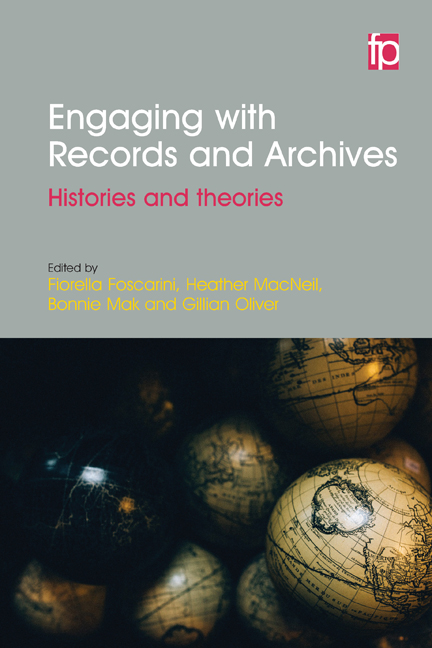Book contents
- Frontmatter
- Frontmatter
- Editors and contributors
- Editors’ introduction
- PART 1 RETHINKING HISTORIES AND THEORIES
- PART 2 ENGAGING RECORDS AND ARCHIVES
- 6 The use and reuse of documents by chancellors, archivists and government members in an early modern republican state: Genoa's Giunta dei confini and its archives
- 7 The bumpy road to transparency: access and secrecy in 19th-century records in the Dutch East Indies
- 8 Archival ethics and indigenous justice: conflict or coexistence?
- 9 History and development of information and recordkeeping in Malawi
- 10 History of community archiving in Poland
- 11 Reflecting on practice: artists’ experiences in the archives
- Index
7 - The bumpy road to transparency: access and secrecy in 19th-century records in the Dutch East Indies
from PART 2 - ENGAGING RECORDS AND ARCHIVES
Published online by Cambridge University Press: 08 June 2018
- Frontmatter
- Frontmatter
- Editors and contributors
- Editors’ introduction
- PART 1 RETHINKING HISTORIES AND THEORIES
- PART 2 ENGAGING RECORDS AND ARCHIVES
- 6 The use and reuse of documents by chancellors, archivists and government members in an early modern republican state: Genoa's Giunta dei confini and its archives
- 7 The bumpy road to transparency: access and secrecy in 19th-century records in the Dutch East Indies
- 8 Archival ethics and indigenous justice: conflict or coexistence?
- 9 History and development of information and recordkeeping in Malawi
- 10 History of community archiving in Poland
- 11 Reflecting on practice: artists’ experiences in the archives
- Index
Summary
Jede auf Kontinuierlichkeit eingerichtete Herrschhaft ist an irgendeinem entscheidenden Punkt Geheimherrschaft.
(Max Weber)THE CONCEPT OF the archive attracts much attention from scholars, who view archives as sites of epistemological power. The postmodern and anthropological attitude towards archives is appealing to those who are captivated by the elements of power they hold and the social significance of archives. Researchers who are interested in colonial archives unhesitatingly use fetching metaphorical descriptions of the archive as ‘a well regulated paper empire’ (Bowen, 2006, 180) or as a ‘collectively imagined junction of all that was known or knowable, a fantastic representation of an epistemological master pattern, a virtual focal point for the heterogeneous local knowledge of metropolis and empire’ (Richards, 1993, 11). Ann Laura Stoler even attributes almost human qualities to the archive in her search for its ‘pulse’ (Stoler, 2009, 17–53). However important and innovative these approaches may be, and notwithstanding the claim many authors make about their focus on archiving-as-a-process rather than on archives-as-things, they generally pay little attention to the daily routines, debates and dilemmas of recordkeeping in the past. In this article I investigate the daily practices of, dilemmas about and debates on record management in the colonial bureaucracy of the Dutch East Indies in the late 19th century. Historical research into the daily practices and dilemmas not only contributes to a better understanding of the continuities and discontinuities in the management of records but also helps us to comprehend the conceptual changes to the archive over time.
Open access, freedom of information and the right to know versus secrecy, privacy and the right to be forgotten: these conflicting issues play an important role in our present-day information society and largely determine the degree of government transparency. The concept of transparency has a long history, having been an offshoot of the Enlightenment. Transparency is related to the concept of a knowable government, and access to government information is one of the key manifestations of transparency (Scholtes, 2012, 28–35; Frissen, 2016, 31–32). In the Netherlands, the earliest right to access the records of central government was regulated via the issuance of a royal decree in 1856, which was implemented with a companion regulation for the state archive that stated that ‘inhabitants of the kingdom as well as foreigners have access to the archives of the state’ (Ketelaar, 2003, 190–6).
- Type
- Chapter
- Information
- Engaging with Records and ArchivesHistories and Theories, pp. 127 - 146Publisher: FacetPrint publication year: 2016

